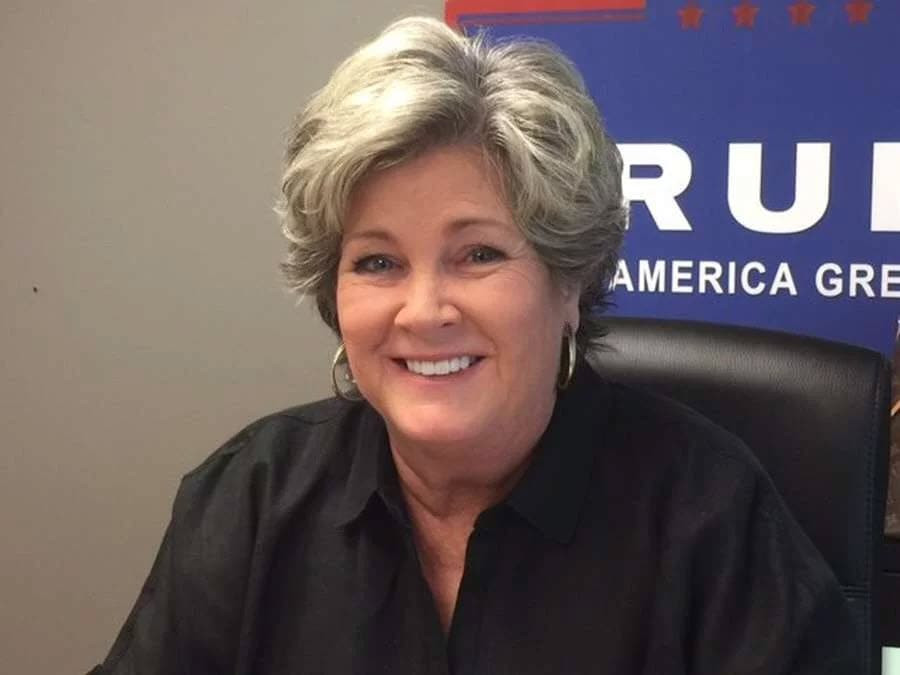With her selection as President-elect Donald Trump’s incoming White House chief of staff, veteran Florida political strategist Susie Wiles moves from a largely behind-the-scenes role of campaign co-chair to the high-profile position of the president’s closest adviser and counsel.
She’s been in political circles for years. But who is Wiles, the operative set to be the first woman to step into the powerful role of White House chief of staff?
The daughter of NFL player and sportscaster Pat Summerall, Wiles worked in the Washington office of New York Rep. Jack Kemp in the 1970s. Following that were stints on Ronald Reagan’s campaign and in his White House as a scheduler.
Wiles then headed to Florida, where she advised two Jacksonville mayors and worked for Rep. Tillie Fowler. After that came statewide campaigns in rough and tumble Florida politics, with Wiles being credited with helping businessman Rick Scott win the governor’s office.
After briefly managing Utah Gov. Jon Huntsman’s 2012 presidential campaign, she ran Trump’s 2016 effort in Florida, when his win in the state helped him clinch the White House.
Two years later, Wiles helped get Ron DeSantis elected as Florida’s governor. But the two would develop a rift that eventually led to DeSantis to urge Trump’s 2020 campaign to cuts its ties with the strategist, when she was again running the then-president’s state campaign.
Wiles ultimately went on to lead Trump’s primary campaign against DeSantis and trounced the Florida governor. Trump campaign aides and their outside allies gleefully taunted DeSantis throughout the race — mocking his laugh, the way he ate and accusing him of wearing lifts in his boots — as well as using insider knowledge that many suspected had come from Wiles and others on Trump’s campaign staff who had also worked for DeSantis and had had bad experiences.
Wiles had posted just three times on X this year at the time of her announcement. Shortly before DeSantis dropped out of the presidential race in January, Wiles made a rare appearance on social media. She responded to a message that DeSantis had cleared his campaign website of upcoming events with a short but clear message: “Bye, bye.”
Joining up with Trump’s third campaign in its nascent days, Wiles is one of the few top officials to survive an entire Trump campaign and was part of the team that put together a far more professional operation for his third White House bid — even if the former president routinely broke through those guardrails anyway.
But she showed she was not above taking on tasks reserved for volunteers. At one of Trump’s appearances in Iowa in July of last year, as the former president posed for pictures with a long line of voters, Wiles grabbed a clipboard and started approaching people waiting to get them to fill out cards committing to caucus for Trump in the leadoff primary contest.
“If we leave the conference room after a meeting and somebody leaves trash on the table, Susie’s the person to grab the trash and put it in the trash can,” said Chris LaCivita, who served as campaign co-chair along with Wiles.
Another of her three posts on X this year was in the closing days of the campaign, clapping back after billionaire Mark Cuban remarked that Trump didn’t have “strong, intelligent women” in his orbit. After Wiles’ selection as White House chief of staff, Sen. Marco Rubio of Florida, a Trump backer, quipped on X that the president-elect had chosen a “strong, intelligent woman” as his chief of staff.
Wiles was able to help control Trump’s worst impulses — not by chiding him or lecturing, but by earning his respect and showing him that he was better off when he followed her advice than flouted it. At one point late in the campaign, when Trump gave a widely criticized speech in Pennsylvania in which he strayed from his talking points and suggested he wouldn’t mind the media being shot, Wiles came out to stare at him silently.
Trump often referenced Wiles on the campaign trail, publicly praising her leadership of what he said he was often told was his “best-run campaign.”
“She’s incredible. Incredible,” he said at a Milwaukee rally earlier this month.
In his first administration, Trump went through four chiefs of staff — including one who served in an acting capacity for a year — in a period of record-setting personnel churn.
A chief of staff serves as the president’s confidant, helping to execute an agenda and balancing competing political and policy priorities. They also tend to serve as a gatekeeper, helping determine whom the president spends their time and to whom they speak — an effort under which Trump chafed inside the White House.
Trump has repeatedly said he believes the biggest mistake of his first term was hiring the wrong people. He was new to Washington then, he has said, and didn’t know any better.
But now, Trump says, he knows the “best people” and those to avoid for jobs.
President-elect Donald Trump has named his first appointee for his upcoming term: campaign manager Susie Wiles will serve as Trump’s White House Chief of Staff.
Wiles will be the first woman to serve as White House Chief of Staff.
Wiles managed Trump’s campaign quietly, making very few media or public appearances, though Trump proudly presented her during his election night speech in Palm Beach, Fla., saying “Susie likes to stay sort of in the back, let me tell you. The Ice Maiden. We call her the Ice Maiden.”
He asked if she wished to speak and she demurred, pushing campaign senior advisor — and her counterpart — Chris LaCivita forward.
In a statement, Trump touted her role in his 2024 election win and called her “tough, smart, innovative, and is universally admired and respected.” He went on to say it will be “a well deserved honor to have Susie as the first-ever female Chief of Staff in United States history.”
Wiles has worked for the Trump political operation off and on since 2016. She originally ran the campaign’s operations in Florida, before helping then-candidate Ron DeSantis win the governorship in 2018, something she has called the “biggest mistake” of her career, according to an interview with The Atlantic’s Tim Alberta.
She was named CEO of Trump’s Save America PAC in 2021 and became a senior member of the campaign leadership when Trump announced his run to retake the White House.
US President-elect Donald Trump has announced his campaign manager, Susan Summerall Wiles, will serve as his White House chief of staff when he takes over the presidency next year.
In a statement, Trump said that Wiles “just helped me achieve one of the greatest political victories in American history” and “is tough, smart, innovative, and is universally admired and respected”.
“It is a well deserved honour to have Susie as the first-ever female chief of staff in United States history,” he continued. “I have no doubt that she will make our country proud.”
Wiles, 67, is the first woman to be appointed White House chief of staff.
The Trump transition team is currently working to choose top members of the incoming Republican administration, including the heads of all 15 executive departments, such as the secretaries of state and defence, from 20 January.
In his victory speech this week, Trump referred to Wiles as “the ice maiden” as she stood behind him on stage.
She operates mostly “in the back”, the president-elect said, but she is known as one of the most feared political operatives in the US.
“Susie will continue to work tirelessly to Make America Great Again,” he added in his statement on Thursday, referring to his oft-repeated campaign slogan.
Donald Trump announced on Thursday that his campaign manager, Susie Wiles, will be named his White House chief of staff.
“Susie Wiles just helped me achieve one of the greatest political victories in American history, and was an integral part of both my 2016 and 2020 successful campaigns,” the president-elect said in a statement.
“Susie is tough, smart, innovative, and is universally admired and respected. Susie will continue to work tirelessly to Make America Great Again. It is a well deserved honor to have Susie as the first-ever female Chief of Staff in United States history. I have no doubt that she will make our country proud,” Trump added.
CNN reported earlier Thursday that Wiles was considered the front-runner for the job but had some reservations about the role and had expressed to Trump certain conditions before she accepted, a source said. At the top of the list was more control over who can reach the president in the Oval Office.
“The clown car can’t come into the White House at will,” the source said. “And he agrees with her.”
During Trump’s first term, his chiefs of staff struggled to prevent a roving cast of informal advisers, family members, friends and other interlopers from getting inside the White House to meet with him. Trump is often influenced on an issue by whoever he speaks to last, a fact that is well known within his circle and one that made life difficult on his top aides.
Wiles was widely credited for running what was seen as Trump’s most sophisticated and disciplined campaign, which included keeping many of the fringe voices in his orbit at bay.
For most of the campaign, she was in charge of the flight manifest for Trump’s private plane – a thankless job that required her to shut down access to the former president when he wouldn’t tell someone “no” himself. At times, she also had to confront Trump about keeping certain people at arm’s length – though, her inability to prevent far-right provocateur Laura Loomer from joining the former president at a debate and a 9/11 memorial service created significant blowback for her boss.
Brooke Rollins, who was also under consideration for chief of staff and had some big names aligning with her, stood down from vying from the role Wednesday after it became clear that seeking it would amount to a serious power struggle with Wiles and that the role was Wiles’ for the taking, according to a person familiar.
Rollins, who served in Trump’s first term, now runs the America First Policy Institute and is still expected to have a role in the second Trump administration.
The chief of staff post — the second-most-important office in the West Wing — is one of the few remaining jobs in the federal government to have never been held by a woman. Kamala Harris was the first woman to be vice president. And many other senior positions in the government have been helmed by women, including almost all of the Cabinet posts, top judicial seats and House leadership roles. But no woman has ever assumed the top Pentagon position, nor has one served on the joint chiefs of staff or as the chief justice of the Supreme Court.
The daughter of the late NFL broadcaster Pat Summerall and a seasoned political operative from Florida, Wiles is one of the longest-serving advisers in Trump’s orbit. After helping him win Florida in 2020, she served as his de facto chief of staff during his post-presidency and then led his campaign for the entirety of the race – a rare feat in Trump world.
On election night, Trump credited Wiles during his victory speech, though she declined to address the crowd gathered at the Palm Beach Convention Center, instead turning the microphone over to co-campaign manager Chris LaCivita.
“Susie Wiles ran Trump’s best campaign of the three, and it wasn’t particularly close,” Turning Point USA CEO Charlie Kirk wrote on X. “She’s disciplined, she’s smart, and she doesn’t seek the limelight. She would make an incredible Chief of Staff. The president, and America, would be well served with Susie in that key role.”

















